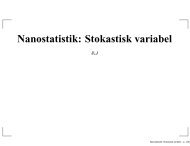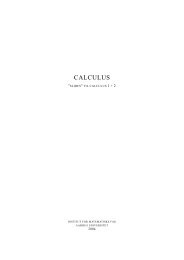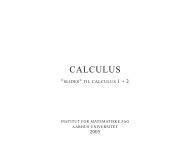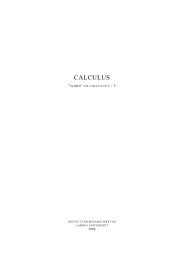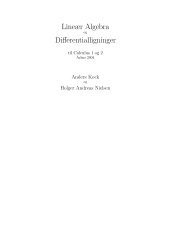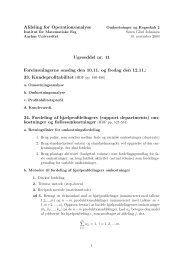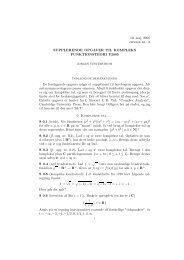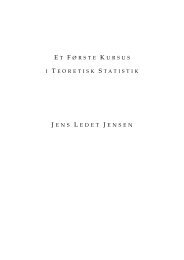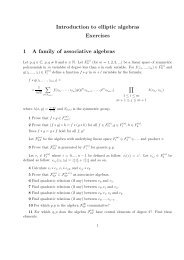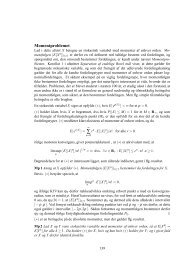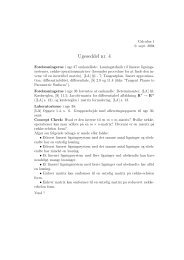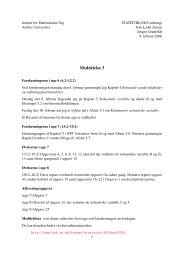Commutative algebra - Department of Mathematical Sciences - old ...
Commutative algebra - Department of Mathematical Sciences - old ...
Commutative algebra - Department of Mathematical Sciences - old ...
You also want an ePaper? Increase the reach of your titles
YUMPU automatically turns print PDFs into web optimized ePapers that Google loves.
7.3. ARTINIAN RINGS 87<br />
7.2.9. Proposition. Given submodules N, L ⊂ M. Then the following are equivalent.<br />
(1) M/N, M/L have finite length.<br />
(2) M/N ∩ L has finite length.<br />
If finite length<br />
ℓR(M/N + L) + ℓR(M/N ∩ L) = ℓR(M/N) + ℓR(M/L)<br />
Pro<strong>of</strong>. Use the sequences 3.2.8.<br />
7.2.10. Proposition. A R-module M <strong>of</strong> finite length is finite and generated by<br />
ℓR(M) or less elements.<br />
Pro<strong>of</strong>. There is a sequence 0 → N → M → L → 0 with L simple. Conclusion<br />
by induction.<br />
7.2.11. Proposition. Let I ⊂ R be an ideal. Suppose an R/I-module M has finite<br />
length. Then M has finite length as R-module and<br />
ℓ R/I(M) = ℓR(M)<br />
Pro<strong>of</strong>. This follows from 7.1.6 and 7.2.2.<br />
7.2.12. Example. Let K be a field. A module M is <strong>of</strong> finite length if it is a finite<br />
dimensional vector space. Then<br />
7.2.13. Exercise. (1) Compute<br />
(2) Compute<br />
ℓZ(Z/(p n1<br />
1<br />
ℓK(M) = rankK M<br />
. . . pnk<br />
k )) = n1 + · · · + nk<br />
ℓ K[X](K[X]/((X − a1) n1 . . . (X − ak) nk )) = n1 + · · · + nk<br />
7.3. Artinian Rings<br />
7.3.1. Lemma. Let M be a module. The following conditions are equivalent.<br />
(1) Any decreasing sequence Mi <strong>of</strong> submodules is stationary, Mn = Mn+1 for<br />
n >> 0.<br />
(2) Any nonempty subset <strong>of</strong> submodules <strong>of</strong> M contains a minimal element.<br />
Pro<strong>of</strong>. (1) ⇒ (2): Suppose a nonempty subset <strong>of</strong> submodules do not contain a<br />
minimal element. Then choose a non stationary sequence. (2) ⇒ (1): A descending<br />
sequence containing a minimal element is stationary.<br />
7.3.2. Definition. A module M which satisfies the conditions <strong>of</strong> 7.3.1 is an artinian<br />
module.<br />
7.3.3. Definition. A ring R is an artinian ring if R is an artinian module over<br />
itself.<br />
7.3.4. Proposition. Let 0 → N → M → L → 0 be an exact sequence <strong>of</strong> modules<br />
over the ring R. Then M is artinian if and only if N and L are artinian.



